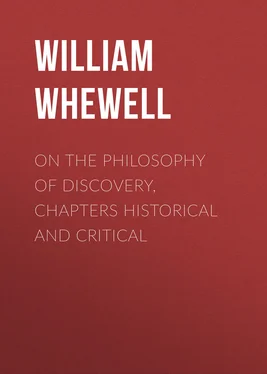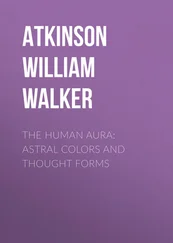William Whewell - On the Philosophy of Discovery, Chapters Historical and Critical
Здесь есть возможность читать онлайн «William Whewell - On the Philosophy of Discovery, Chapters Historical and Critical» — ознакомительный отрывок электронной книги совершенно бесплатно, а после прочтения отрывка купить полную версию. В некоторых случаях можно слушать аудио, скачать через торрент в формате fb2 и присутствует краткое содержание. Жанр: foreign_prose, foreign_religion, Философия, foreign_psychology, foreign_antique, на английском языке. Описание произведения, (предисловие) а так же отзывы посетителей доступны на портале библиотеки ЛибКат.
- Название:On the Philosophy of Discovery, Chapters Historical and Critical
- Автор:
- Жанр:
- Год:неизвестен
- ISBN:нет данных
- Рейтинг книги:5 / 5. Голосов: 1
-
Избранное:Добавить в избранное
- Отзывы:
-
Ваша оценка:
- 100
- 1
- 2
- 3
- 4
- 5
On the Philosophy of Discovery, Chapters Historical and Critical: краткое содержание, описание и аннотация
Предлагаем к чтению аннотацию, описание, краткое содержание или предисловие (зависит от того, что написал сам автор книги «On the Philosophy of Discovery, Chapters Historical and Critical»). Если вы не нашли необходимую информацию о книге — напишите в комментариях, мы постараемся отыскать её.
On the Philosophy of Discovery, Chapters Historical and Critical — читать онлайн ознакомительный отрывок
Ниже представлен текст книги, разбитый по страницам. Система сохранения места последней прочитанной страницы, позволяет с удобством читать онлайн бесплатно книгу «On the Philosophy of Discovery, Chapters Historical and Critical», без необходимости каждый раз заново искать на чём Вы остановились. Поставьте закладку, и сможете в любой момент перейти на страницу, на которой закончили чтение.
Интервал:
Закладка:
With regard to Tycho's discoveries respecting the moon, it is to be recollected that besides the first inequality of the moon's motion, (the equation of the centre , arising from the elliptical form of her orbit,) Ptolemy had discovered a second inequality, the evection , which, as we have observed in the History of this subject 164 164 Hist. Ind. Sc. b. ii. c. iv. sect. 6.
, might have naturally suggested the suspicion that there were still other inequalities. In the middle ages, however, such suggestions, implying a constant progress in science, were little attended to; and, we have seen, that when an Arabian astronomer 165 165 Ibid. sect. 8.
had really discovered another inequality of the moon, it was soon forgotten, because it had no place in the established systems. Tycho not only rediscovered the lunar inequality, (the variation ,) thus once before won and lost, but also two other inequalities; namely 166 166 Montucla, i. 566.
, the change of inclination of the moon's orbit as the line of nodes moves round, and an inequality in the motion of the line of nodes. Thus, as I have elsewhere said, it appeared that the discovery of a rule is a step to the discovery of deviations from that rule, which require to be expressed in other rules. It became manifest to astronomers, and through them to all philosophers, that in the application of theory to observation, we find, not only the stated phenomena, for which the theory does account, but also residual phenomena , which are unaccounted for, and remain over and above the calculation. And it was seen further, that these residual phenomena might be, altogether or in part, exhausted by new theories.
These were valuable lessons; and the more valuable inasmuch as men were now trying to lay down maxims and methods for the conduct of science. A revolution was not only at hand, but had really taken place, in the great body of real cultivators of science. The occasion now required that this revolution should be formally recognized;—that the new intellectual power should be clothed with the forms of government;—that the new philosophical republic should be acknowledged as a sister state by the ancient dynasties of Aristotle and Plato. There was needed some great Theoretical Reformer, to speak in the name of the Experimental Philosophy; to lay before the world a declaration of its rights and a scheme of its laws. And thus our eyes are turned to Francis Bacon, and others who like him attempted this great office. We quit those august and venerable names of discoverers, whose appearance was the prelude and announcement of the new state of things then opening; and in doing so, we may apply to them the language which Bacon applies to himself 167 167 De Augm. lib. iv. c. 1.
:—
CHAPTER XV.
Francis Bacon
(I.) 1. General Remarks. —It is a matter of some difficulty to speak of the character and merits of this illustrious man, as regards his place in that philosophical history with which we are here engaged. If we were to content ourselves with estimating him according to the office which, as we have just seen, he claims for himself 168 168 And in other passages: thus, "Ego enim buccinator tantum pugnam non ineo." Nov. Org. lib. iv. c. i.
, as merely the harbinger and announcer of a sounder method of scientific inquiry than that which was recognized before him, the task would be comparatively easy. For we might select from his writings those passages in which he has delivered opinions and pointed out processes, then novel and strange, but since confirmed by the experience of actual discoverers, and by the judgments of the wisest of succeeding philosophers; and we might pass by, without disrespect, but without notice, maxims and proposals which have not been found available for use;—views so indistinct and vague, that we are even yet unable to pronounce upon their justice;—and boundless anticipations, dictated by the sanguine hopes of a noble and comprehensive intellect. But if we thus reduce the philosophy of Bacon to that portion which the subsequent progress of science has rigorously verified, we shall have to pass over many of those declarations which have excited most notice in his writings, and shall lose sight of many of those striking thoughts which his admirers most love to dwell upon. For he is usually spoken of, at least in this country, as a teacher who not only commenced, but in a great measure completed, the Philosophy of Induction. He is considered, not only as having asserted some general principles, but laid down the special rules of scientific investigation; as not only one of the Founders, but the supreme Legislator of the modern Republic of Science; not only the Hercules who slew the monsters that obstructed the earlier traveller, but the Solon who established a constitution fitted for all future time.
2. Nor is it our purpose to deny that of such praise he deserves a share which, considering the period at which he lived, is truly astonishing. But it is necessary for us in this place to discriminate and select that portion of his system which, bearing upon physical science, has since been confirmed by the actual history of science. Many of Bacon's most impressive and captivating passages contemplate the extension of the new methods of discovering truth to intellectual, to moral, to political, as well as to physical science. And how far, and how, the advantages of the inductive method may be secured for those important branches of speculation, it will at some future time be a highly interesting task to examine. But our plan requires us at present to omit the consideration of these; for our purpose is to learn what the genuine course of the formation of science is, by tracing it in those portions of human knowledge, which, by the confession of all, are most exact, most certain, most complete. Hence we must here deny ourselves the dignity and interest which float about all speculations in which the great moral and political concerns of men are involved. It cannot be doubted that the commanding position which Bacon occupies in men's estimation arises from his proclaiming a reform in philosophy of so comprehensive a nature;—a reform which was to infuse a new spirit into every part of knowledge. Physical Science has tranquilly and noiselessly adopted many of his suggestions; which were, indeed, her own natural impulses, not borrowed from him; and she is too deeply and satisfactorily absorbed in contemplating her results, to talk much about the methods of obtaining them which she has thus instinctively pursued. But the philosophy which deals with mind, with manners, with morals, with polity, is conscious still of much obscurity and perplexity; and would gladly borrow aid from a system in which aid is so confidently promised. The aphorisms and phrases of the Novum Organon are far more frequently quoted by metaphysical, ethical, and even theological writers, than they are by the authors of works on physics.
3. Again, even as regards physics, Bacon's fame rests upon something besides the novelty of the maxims which he promulgated. That a revolution in the method of scientific research was going on, all the greatest physical investigators of the sixteenth century were fully aware, as we have shown in the last chapter. But their writings conveyed this conviction to the public at large somewhat slowly. Men of letters, men of the world, men of rank, did not become familiar with the abstruse works in which these views were published; and above all, they did not, by such occasional glimpses as they took of the state of physical science, become aware of the magnitude and consequences of this change. But Bacon's lofty eloquence, wide learning, comprehensive views, bold pictures of the coming state of things, were fitted to make men turn a far more general and earnest gaze upon the passing change. When a man of his acquirements, of his talents, of his rank and position, of his gravity and caution, poured forth the strongest and loftiest expressions and images which his mind could supply, in order to depict the "Great Instauration" which he announced;—in order to contrast the weakness, the blindness, the ignorance, the wretchedness, under which men had laboured while they followed the long beaten track, with the light, the power, the privileges, which they were to find in the paths to which he pointed;—it was impossible that readers of all classes should not have their attention arrested, their minds stirred, their hopes warmed; and should not listen with wonder and with pleasure to the strains of prophetic eloquence in which so great a subject was presented. And when it was found that the prophecy was verified; when it appeared that an immense change in the methods of scientific research really had occurred;—that vast additions to man's knowledge and power had been acquired, in modes like those which had been spoken of;—that further advances might be constantly looked for;—and that a progress, seemingly boundless, was going on in the direction in which the seer had thus pointed;—it was natural that men should hail him as the leader of the revolution; that they should identify him with the event which he was the first to announce; that they should look upon him as the author of that which he had, as they perceived, so soon and so thoroughly comprehended.
Читать дальшеИнтервал:
Закладка:
Похожие книги на «On the Philosophy of Discovery, Chapters Historical and Critical»
Представляем Вашему вниманию похожие книги на «On the Philosophy of Discovery, Chapters Historical and Critical» списком для выбора. Мы отобрали схожую по названию и смыслу литературу в надежде предоставить читателям больше вариантов отыскать новые, интересные, ещё непрочитанные произведения.
Обсуждение, отзывы о книге «On the Philosophy of Discovery, Chapters Historical and Critical» и просто собственные мнения читателей. Оставьте ваши комментарии, напишите, что Вы думаете о произведении, его смысле или главных героях. Укажите что конкретно понравилось, а что нет, и почему Вы так считаете.












